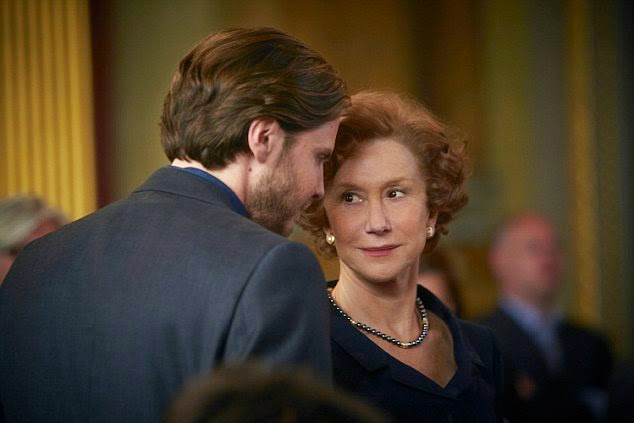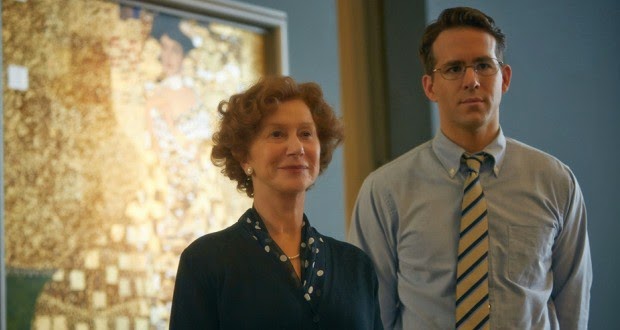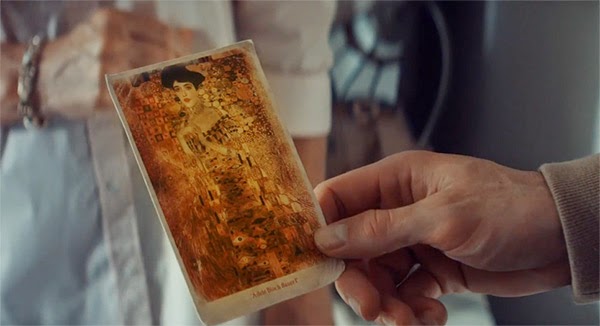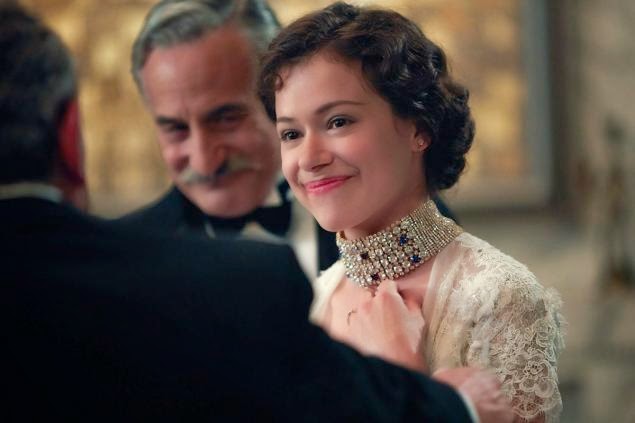It's 1938 and a young woman has just been married. She and her husband are so happy together, but their joy is short-lived. Just a few weeks after their wedding, Nazi troops march into Austria and occupy their home city of Vienna. The woman and her family fear for their lives because they are Jews and they know what might be coming.
The woman and her husband are eventually able to escape to the United States, but her parents are not. They are left behind and die in the death camps. The woman starts a new life in California with what is left of her family and none of their treasured possessions, paintings, photographs, or any ties to their history. Specifically, the woman is saddened to realize that she will never get to see a certain painting again. It's a painting of her aunt, the beloved Adele, and the painting has been seized by the Nazi party, scrubbed of its Jewish history, and hung on the walls of an art museum in Austria.
This is not the story of my family, but it could be. It very easily could be. No, this is the story of Woman in Gold, a film that so closely mirrors my family history that it was honestly kind of uncanny.
I mention this because on Saturday afternoon I watched Woman in Gold with my sister. I thought it was going to be a good movie about art and history, topics both of us enjoy, a sort of nice "triumph of the human spirit" movie that we could watch after getting Chipotle and then go our separate ways. Plus, we've always joked that Helen Mirren looks a lot like our grandmother, so we thought it would be funny to see her play this character.
It wasn't funny. It was heartbreaking, but in such a good way. Because Helen Mirren wasn't playing a woman like our grandmother - as far as I can tell, she was playing our grandmother. The mannerisms, the clothes, the makeup, the details, the story, it was all the story and tragedy of our grandmother and our lives. I'm not ashamed to admit that I cried. But I am ashamed to admit that I misjudged this movie. I heard the reviews calling it "melodramatic" and "overwrought" and I thought it might be something good but not great. A nice movie, but nothing spectacular.
I was wrong, and I'm pretty convinced that those critics didn't see the same movie I did. They complained that this film is basically just a movie about art ownership, about a frivolous petition to get some paintings back, and a movie that is "too emotional" and "too capitalist." I even saw one reviewer complain about how this film was too focused on the monetary worth of the paintings - can't we all learn to share, guys? I am filled with rage.
The thing is, this isn't a movie about art ownership. And to claim that is to intentionally miss the point. This movie is about justice, and how the things we have lost can never really be returned to us, but we can learn to live with their loss. This is a movie about reckoning with the past and finding a way to live with it. Because the point is never the art or the furniture or the jewels that were stolen from us, stolen from the Jews of Europe. The point is the lives lost, destroyed, and simply gone. The point is the guilt I have as a girl who only exists because my grandmother was lucky. The point is justice.
Woman in Gold is not an easy movie, but it is an important one. Based on a true story, it follows the attempts of Maria Altmann (Helen Mirren and Tatiana Maslany) and her lawyer Randy Schoenberg (Ryan Reynolds) to get back five Klimt paintings that the Austrian government stole from her family in 1941.
Specifically, Maria wants back one painting: "Woman in Gold", a painting that is called the "Mona Lisa of Austria." She wants it back because it is a painting of her aunt, a woman she dearly loved, and because it is hers.
The film starts with Maria, after her sister's funeral, asking a family friend for help with a legal matter. This brings in Randy, who is that friend's son, a well-meaning but rather milquetoast lawyer who initially wants nothing to do with the case. Maria would like to at least try to get the painting back, because the Austrian government has just started hearing restitution cases in an act of potential reparation. She wants to know if she can have it back.
Randy eventually comes around (once he sees how much the paintings are worth) and books them both on a flight to Austria. At first Maria is horrified to think of going back to the place that caused her so much pain, but eventually she agrees to go because she so wants to see her aunt again. In Austria, though, they meet with defeat. Despite finding documents that clearly show that the painting legally belongs to Maria, Randy and Maria's petition is politely turned down. The Austrians don't care, they want to keep it.
Maria is ready to go home and admit defeat, but Randy isn't giving up. Being in Vienna, seeing the name of the concentration camp where his great-grandparents were killed, understanding the truth and brutality of his heritage changes him. He becomes obsessed. He and his wife (Katie Holmes, who is very good with her tiny role) eventually come to see this as a matter of justice and reconciliation. They have two small children, and the implication is that this case matters to them because their children have a right to their own stories.
I won't detail all of the ups and downs of the case here - if you really care you can look it up because it was a real case. But suffice to say that even with the help of an Austrian investigative reporter (Daniel Brühl) who is committed to righting the sins of the past, most of the film makes it clear that Austria has no interest in remembering what happened.
Austria does not want to admit the paintings were stolen because that would mean admitting that they did something wrong. If these paintings were stolen, then so was everything else. It would require them to look at their own history and cringe. No one likes to do that.
Like I said, the outcome of this case is a matter of public record and I knew that going in. But that didn't stop me from being on the edge of my seat the whole time. Because it's one thing to know how a case turns out, and it's entirely another to witness the human cost of a petition like that. Maria and Randy both suffer as they dig further and further into the past. But then again, they both come closer to an understanding of who they are and what has happened to them.
There's a point near the end where Maria says, effectively, that she thought getting the painting would in some way help her turn her back on that chapter in her life. That it would give her closure. But the truth is that closure isn't that easy. We all have to look into the face of strangers in the street and wonder, "If that happened again, if the Jews were cast into the streets, would you spit in my face? Would you throw rocks at my mother? Would you paint 'Jew' on my door?"
I feel sometimes that I am not really Jewish enough to claim lineage to this. After all, my family were the lucky ones. We got out before. My life has been relatively free of anti-semitism and discrimination. I'm a Christian by religion, and I've even had other Christians tell me that they envy my Jewish heritage. That it makes me special.
But watching this movie didn't make me feel special. It made me feel sad. Bone sad. Because while I am grateful for the legacy of my family being a lucky one, there was still something lost. Our culture, our past is gone. We don't talk about being Jewish much. Or really at all. I know almost nothing about our life in Germany before the war. Some names and some facts really. I know that it hurt. But I feel that I have been robbed of a rich heritage that should be mine.
Because at what point is it justice and at what point do we need to let the past go? I don't know, I honestly don't.
I said before that Helen Mirren has always reminded me a little bit of my grandmother, but in this movie it was honestly kind of alarming how alike they are. She wore the same clothes, had the same mannerisms, even liked the same alcohol. It was startling. But even more startling were the flashback scenes that showed Maria (played here by Tatiana Maslany) dealing with the increased Nazi menace in Austria. It shows her going from a carefree young bride to a woman determined to live in spite of her circumstances. And while she is admirable and courageous, you're still watching the hope die in her eyes.
 How do you get justice for that? And how do the children of those who survived, and their grandchildren, reckon with a past that is just plain gone? Our family histories largely start after the war. There is nothing before that. Maybe a few details sketched from memory, but no photographs, no keepsakes, no fond remembrances. Where is restitution for what has been lost?
How do you get justice for that? And how do the children of those who survived, and their grandchildren, reckon with a past that is just plain gone? Our family histories largely start after the war. There is nothing before that. Maybe a few details sketched from memory, but no photographs, no keepsakes, no fond remembrances. Where is restitution for what has been lost?I hope you can see that this isn't an objective film review, because in what would could it be? This wasn't like watching a movie, it was like seeing our past unfold on a screen and wondering what relation we are to it. It was also, to my opinion, one of the best Holocaust movies that American cinema has ever managed, if only by sheer virtue of being one of the only ones actually about Jews.
Think about it. Schindler's List is about gentiles who happen to be nice, The Hiding Place (though amazing) is about Christians helping Jews, and most movies we make about World War II have American soldiers going in and finding the concentration camps, but the only conversation they make is about how seeing all those dead and destroyed Jews made them feel sad.
Our history has largely not been written by us and has rarely been written about us at all. So it was nice to see a movie that managed it at all (even if Helen Mirren, Tatiana Maslany, and Ryan Reynolds are all gentiles).
At the time, I was mostly bored. The displays were all in German (which I didn't yet speak), the dioramas weren't very good, and the submarine outside was cool, but I'd seen cooler. But my mother stopped at one point and looked stunned. When I asked her why, she said, simply, "They don't mention it here. It's a whole museum and they don't mention it."
I never had to ask what "it" was.
 |
| Also Daniel Brühl stole my heart in this movie like so hard. Even more than in Goodbye Lenin! |







I'm so glad that you got to see this. So many people have overlooked it for being subtle but I think it was truly heartbreaking. I'm not going to lie when I first went in it was just for Tatiana, Helen and Ryan Reynolds but the film itself was incredibly sad. The bit that really got me was when she was leaving the conference and that man tells her to just let it go. I swear if I could jump through a screen I would have punched him
ReplyDeleteLikewise when the case is won, and the Austrian government asshole decides *now* is the time it's reasonable to seek some sort of compromise. I could have cheered when Maria tore him his new one.
DeleteOh gosh, that part with the guy made me want to scream-cry. It's just so miserably and horribly true. They block you and do everything they can to keep you from getting justice, and then they ask you to forget all about it after. Graaaaaargh.
DeleteWhich made the scene where Maria calmly rips him apart so satisfying.
I heard the reviews calling it "melodramatic" and "overwrought" and I thought it might be something good but not great. ... I was wrong, and I'm pretty convinced that those critics didn't see the same movie I did.
ReplyDeleteI don't have anything like the personal connection to this film that you do. But I have to wonder the same thing about these critics.
Especially that part about being too focussed on the monetary worth of the painting, since that was one of the cornerstones of *why* the Austrian government refused to give it up. And it was *how* they sought to define the case into the abstract, and obfuscate any of the questions of history and justice. Buying into it is spectacularly wide of the point.
Randy eventually comes around (once he sees how much the paintings are worth) and books them both on a flight to Austria.
Hell, we even have a character whose *specific arc* is about realising this.
Oh man. Like, the idea that this was about money is abhorrent to me. I love that they show Randy coming to the realization that his interest in the money was ultimately wrong. But I am deeply frustrated with how the media functionally takes Austria's side in it by reducing it all to monetary value.
DeleteThere's this habitual notion, a dangerous one, that the Nazis were a unique special snowflake evil that normal people aren't capable of. If the fate of the painting is just a matter of money, then you don't have to think thoughts like this:
DeleteAs the movie makes very clear, those who choose to look away from the truth of genocide and brutality and ugly history are in fact enacting another form of violence on those who survived.
... and you get to pretend that their crimes are all over and done with, not something you yourself can be perpetuating.
YES. I feel like that a lot. Because we very much dehumanize the Nazis in order to make ourselves feel better. If the Nazis are an example of the worst evil humanity has ever produced then in a weird way it gets the rest of us off the hook. We can just blame it on some very bad men and never examine our own complicity in evil.
DeleteWhich, yeah, is not okay. Because evil is never over and done with, and the repercussions of a single act can and will reverberate for centuries. We like to pretend that American Slavery ended in 1865 and nothing was ever bad again, but the truth is that nothing is ever even close to being that easy, and while the actual slave owners have died, we white people still live and function in effectively the same society. We need to acknowledge our own guilt in order to actually move forward.
KOLKATA CALL GIRLS
ReplyDeleteKOLKATA CALL GIRLS
CALL GIRLS KOLKATA
CALLL GIRL kolkata
FEMALE CALL GIRLS KOLKATA
FEMALE CALL GIRLS
SEXY CALL GIRLS SERVICE IN KOLKATA
ESCORTS SERVICE IN KOLKATA
KOLKATA FEMALE ESCORT SERVICE
TOP ESCORTS SERVICE KOLKATA
BEST KOLKATA ESCORTS SERVICE
CALL GIRLS SERVICE
ESCORTS SERVICE
ESCORT SERVICE
ESCORTS SERVICE IN KOLKATA
BENGOLI ESCORTS GIRLS
BENGOLI CALL GIRLS KOLKATA
KOLKATA ESCORTS SERVICE
FREE ESCORTS SERVICE KOLKATA
FREE WHATSAAP NUMBER ESCORTS
FREE WHATSAAP NUMBER OF CALL GIRLS
PHONE NUMBER OF ESCORTS SERVICE
FREE PHONE NUMBER ESCORTS SERVICE
MOBILE NUMBER OF ESCORTS SERVICE